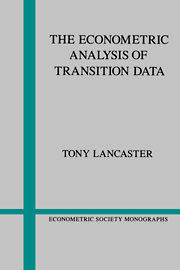Book contents
9 - Limited Information Inference
Published online by Cambridge University Press: 05 January 2013
Summary
Introduction and Overview
To construct the likelihood functions described in chapter 8 requires that an investigator assume a form for the joint probability density function of the data up to a finite set of unknown parameters. That assumption constitutes information supplied by the investigator, and since it gives the complete joint data distribution it is appropriate to call it full information. It is possible to carry out an econometric analysis using assumptions that amount to less than such a full specification. It seems useful to call such analyses limited information by analogy with the econometric simultaneous equations model in which limited information analysi requires less than a full specification of all equations in the system. These methods are also called semi-parametric.
The situation in which economic theory suggests only part of the model for data is rather common in econometrics. It corresponds to the idea that there may be components of a model specification that are, from the economic point of view, at best uncertain and at worst entirely arbitrary. We have already considered at some length the case in which theory might indicate a specification of the hazard function of the form ϴ = νμ(x1β) given the regressor vector x and the unobserved scalar ν. A complete model then requires us to specify the density function of V given x, and economic theory offers little guidance on this. In this case, theory does not lead us to a complete model and the question then arises as to whether we can devise a likelihood function that will enable us to make inferences about β while allowing us to avoid specifying the distribution of V.
- Type
- Chapter
- Information
- The Econometric Analysis of Transition Data , pp. 233 - 293Publisher: Cambridge University PressPrint publication year: 1990



